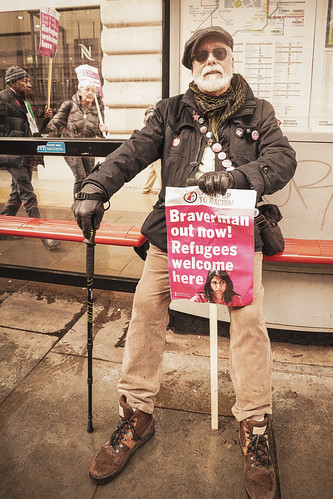Braverman ‘interfering with police independence’ after crime pledge
Braverman #Braverman

Police chiefs have suggested the home secretary is interfering with their operational independence by demanding forces pursue all reasonable crime leads at a time when their resources are being outstripped by a rise in offences.
The National Police Chiefs’ Council (NPCC) raised serious doubts about an initiative Suella Braverman used to launch the government’s crime week with insistence that there was “no such thing as minor crime”.
Braverman instructed forces to follow all evidence such as footage from CCTV, doorbells and dashcams, as well as phone data, to find a suspect or stolen property.
The NPCC responded to the plan in an open letter to Braverman, which pointedly began: “For decades, police forces have had a duty to pursue all reasonable leads of an alleged crime.”
On Monday, Braverman said forces had the resources to pursue all reasonable leads, and pointed to the government’s restoration of 20,000 officers that were cut between 2010 and 2018.
However, the letter by the NPCC chair, chief constable Gavin Stephens, suggested her plan was unrealistic given the squeeze on police funding at a time of rising crime.
“To see trust in police return to where it used to be, an effectively staffed and properly funded police service is essential,” the letter said.
Stephens said that 21 of the 43 forces in England and Wales “still have less officers than in 2010”. He added: “It is therefore right that police chiefs have operational independence and are responsible for making difficult decisions around how best to respond to the breadth of priorities of local communities.”
The letter welcomed the restoration of 20,000 officers cut under austerity as a recognition by the government that “much more is needed to meet increasing and changing demands”. But it added: “There is much more that can and should be done. Although the additional officers go some way to support these changes the reality is that since 2010, the number of officers has increased by just 2.6%, while recorded crime has increased by 25%.”
Launching her initiative, Braverman repeated the government’s claim that crime has fallen in the last decade. This claim has been challenged by many including Full Fact, which said the figure does not include fraud or commuter misuse.
The NPCC’s letter also said that crime was rising. It said: “In 2022/23, a total of 5.24m crimes were recorded by police – an increase of over 1m since 2010/11, when recorded crime sat at 4.15m. This means there is more recorded crime per police officer.”
The letter cited a series of additional pressures facing officers to suggest that the policy of pursuing all reasonable leads would be difficult and a distraction from local priorities. These included the increasing complexity of crime due to new technology and delays in the criminal justice system.
The letter said: “We have backlog in the court system due to increasing caseloads and prisons nearing capacity, placing pressure on police custody cells. We are all working hard to fix this within our own remits, but more needs to be done together.”
Braverman said: “The police have made progress in preventing crime across the country with neighbourhood offences like burglary, robbery and vehicle theft down by 51% since 2010.
“Despite this success, since I became home secretary I’ve heard too many accounts from victims where police simply haven’t acted on helpful leads because crimes such as phone and car thefts are seen as less important – that’s unacceptable. It has damaged people’s confidence in policing. Criminals must have no place to hide.”
Labour said Braverman’s initiative amounted to an admission of failure.
The shadow home secretary, Yvette Cooper, said: “Pursuing reasonable leads like CCTV is what the police should be doing, but – because of abysmal Tory management – over 90% of crimes go unsolved, the proportion of crimes prosecuted has dropped by more than two-thirds and more criminals are getting off.
“The fact that the Tories are boasting about asking the police to do the basic minimum that victims of crime should rightly expect, whilst failing to tackle the underlying problems they have caused, shows how badly they have failed over the last 13 years.”